[Big read] From scenic city to tech powerhouse: How Hangzhou became China’s Silicon Valley
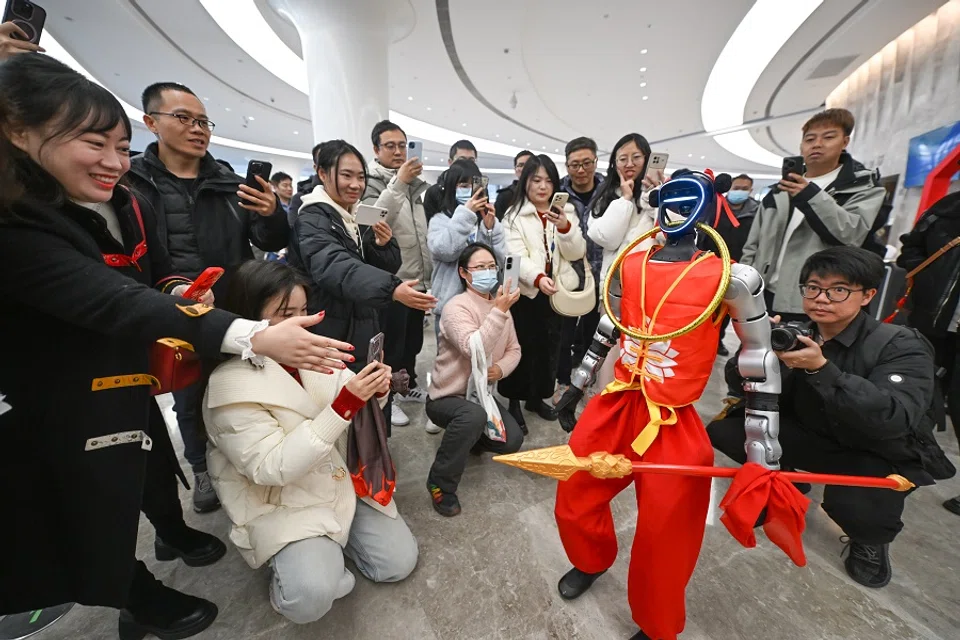
The unassuming city of Hangzhou has recently been in the spotlight after its success in producing a spate of tech wonders known as the “Six Little Dragons”. Lianhe Zaobao Shanghai correspondent Li Kang tells us more about the reasons for the city’s success and its newfound status as a hotbed for tech development.
Investors, suppliers, government officials and potential customers pack a small exhibition hall, barely 100 square metres in size, their conversations, exclamations, and footsteps creating a din that drowns out the staff’s commentary.
In one corner, a robotic dog undergoes intense demonstrations. Its metal surface gleams with a polished shine, yet its joints bear fine scratches, and the protective layer on its elbows is partially worn off.
Almost every day over the past two weeks, this has been the level of buzz seen at Hangzhou-based robotics company DEEP Robotics following its inclusion among Hangzhou’s “Six Little Dragons”.
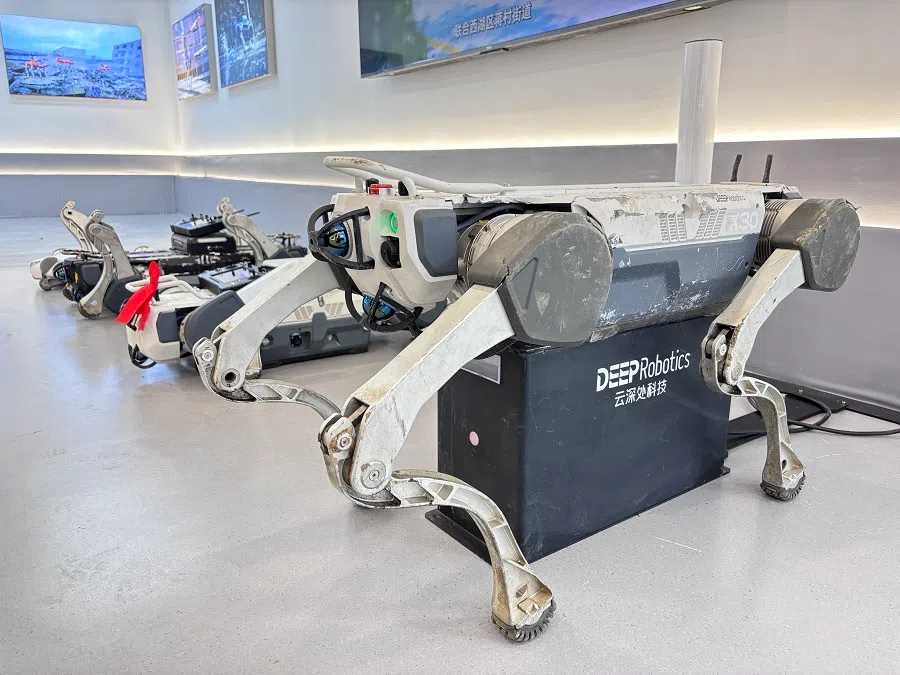
DEEP Robotics business development director Cheng Yuhang told Lianhe Zaobao that in the week before Chinese New Year, the company received over 70 groups of visitors, with as many as 26 groups on a single day after the holiday: “There were not enough meeting rooms,” he says.
Hangzhou tech boom
The Six Little Dragons refers to six breakthrough, cutting-edge technology companies from Hangzhou, including globally trending artificial intelligence (AI) company DeepSeek, game developer Game Science known for its hit game Black Myth: Wukong, brain-computer interface company BrainCo, spatial intelligence firm Manycore, and robotics companies Unitree and DEEP Robotics.
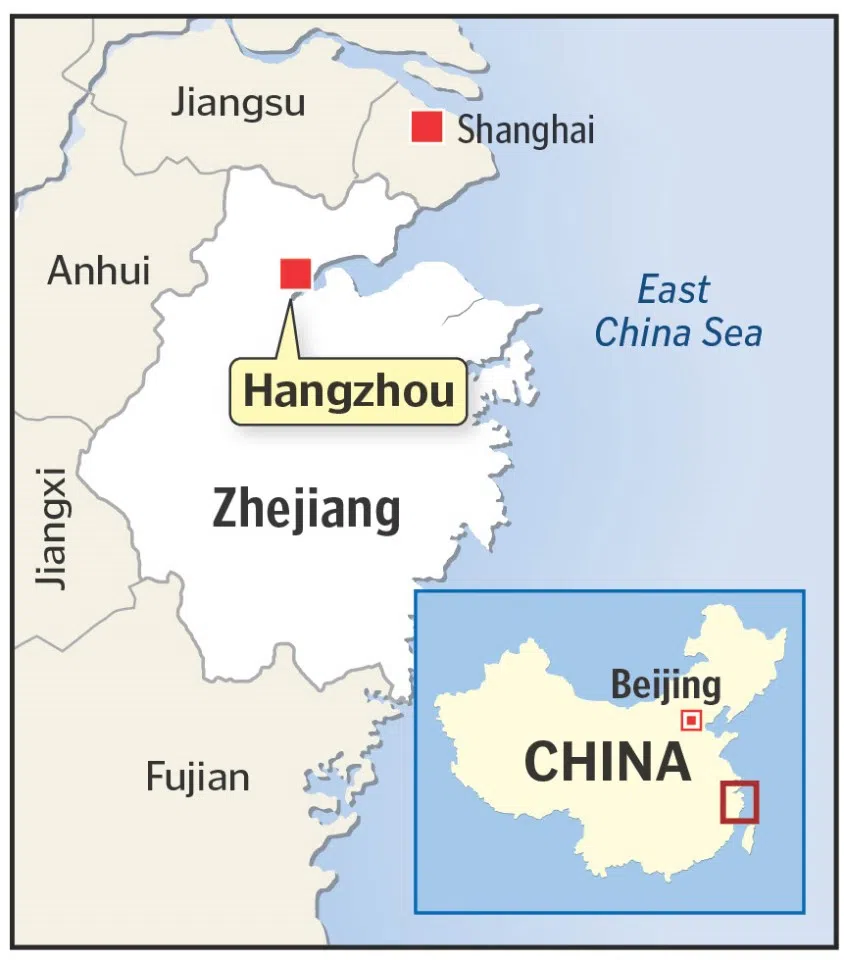
When I visited Hangzhou, the Six Little Dragons were getting increasingly popular. Unitree Robotics, whose robots were featured in the Spring Festival Gala, saw a steady stream of visitors, while the building housing DeepSeek was such a popular check-in spot that Zhejiang province’s top official reportedly issued an order forbidding visitors from causing disruptions.
The tech craze sparked by the Six Little Dragons has also spread to other innovation parks across Hangzhou. In a tech incubator park in Binjiang District, several engineers conducted outdoor robot scenario testing on their lunch break; at a KFC restaurant in a tech park in Xihu District, more than ten tech employees huddled around a computer, fiercely discussing project plans.
Xiang Jianping, founder of Hangzhou-based intelligent medical diagnostics company ArteryFlow, has also noticed the changes brought by the tech boom. When interviewed, he said that before Chinese New Year, entrepreneurs generally felt an economic downturn, but after the holiday, Hangzhou suddenly seemed to have become “the centre of the universe”, where “everyone is seeing a lot of hope”.
In the field of artificial intelligence, in China’s AI city rankings, Hangzhou was second behind only Beijing, maintaining its lead over Shenzhen for the fourth year running.
Hangzhou’s transformation is no coincidence
With the rise of the Six Little Dragons, Hangzhou has evolved from being China’s e-commerce capital into the country’s hottest new tech city.
Official data shows that as of December last year, Hangzhou was home to more than 200 robotics-related companies, with the city’s robotics industry output reaching 15 billion RMB (US$2.07 billion) in 2023. In the field of artificial intelligence, in China’s AI city rankings, Hangzhou was second behind only Beijing, maintaining its lead over Shenzhen for the fourth year running.
Industry experts and academics interviewed unanimously agree that Hangzhou’s transformation is no coincidence. Rather, it is the inevitable result of years of groundwork, driven by the city’s deep talent pool and industrial ecosystem built during the internet boom, as well as strong policy support and a business-friendly environment.
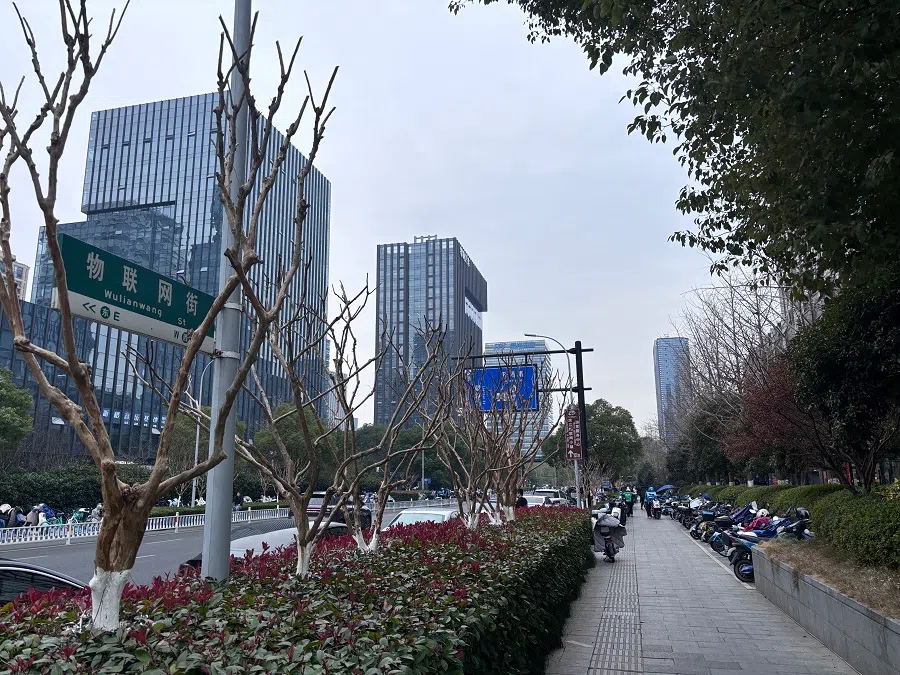
Cheng Yuhang said programmers are an essential component of emerging technology industries — whether in coding or algorithms, the work relies on “code farmers” (a popular nickname for programmers). As China’s internet hub, Hangzhou has nurtured many programmers over the years.
Shan Wei, a senior research fellow at the East Asian Institute (EAI) of the National University of Singapore (NUS), speculated in an interview with Lianhe Zaobao that Hangzhou’s well-developed upstream and downstream industrial chains have created favourable conditions for the emergence of tech startups.
For example, Alibaba Cloud, China’s largest cloud computing platform, serves as an upstream provider, offering AI startups ample computing power. Meanwhile, various downstream internet companies provide diverse scenarios for testing and applying AI models.
... the Six Little Dragons that the public sees are just the tip of a pyramid. But for the tip to stand out, it requires a massive base for support, and Hangzhou’s highly active private economy serves as that foundation. — Shan Wei, Senior Research Fellow, EAI, NUS
However, Shan Wei believes that the key reason why tech companies can thrive in Hangzhou is its robust private economy.
He said the Six Little Dragons that the public sees are just the tip of a pyramid. But for the tip to stand out, it requires a massive base for support, and Hangzhou’s highly active private economy serves as that foundation.
As China’s leading city for private enterprises, Hangzhou has consistently topped various rankings in recent years. In a survey of private enterprises initiated by the All-China Federation of Industry and Commerce, Hangzhou has ranked first for five consecutive years. Additionally, the city has held the top spot for 22 consecutive years in terms of the number of companies listed among the “Top 500 Chinese Private Enterprises”.
On 17 February, Chinese President Xi Jinping held a symposium with private enterprises, attended by prominent Zhejiang entrepreneurs such as Jack Ma, Wang Xingxing, Nan Cunhui and Xu Guanju, making Zhejiang the most prominently featured province in the meeting.
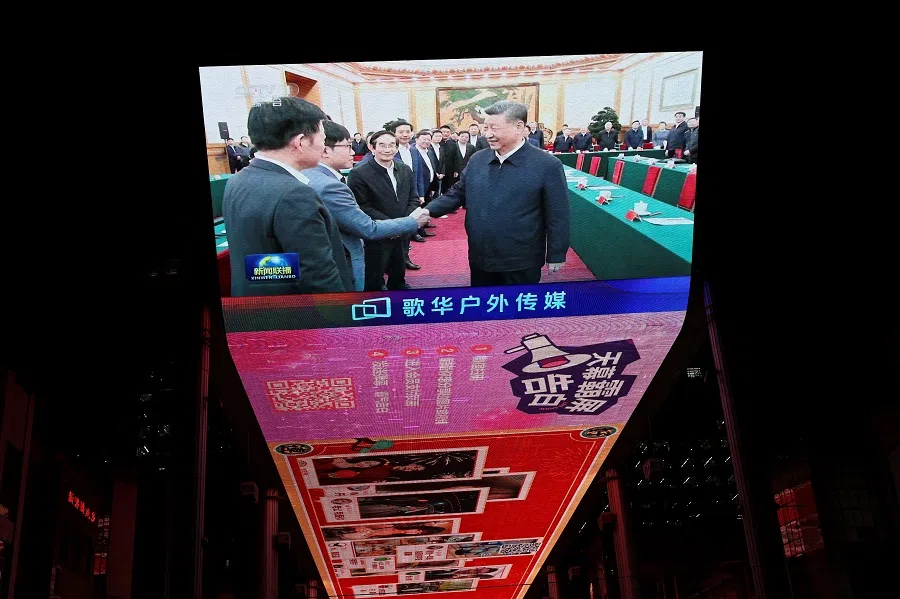
Hangzhou’s strong business-oriented culture has also influenced the local government’s approach. In the early days of China’s economic reforms, Zhejiang pioneered the “Wenzhou model”, which encouraged innovation and allowed private enterprises to flourish. When e-commerce giant Alibaba was founded in the late 1990s and faced widespread scepticism, Hangzhou’s response was to provide “cautious but firm support”.
When businesses encounter difficulties, “we don’t have to go to the government — they come to us proactively.” — Fu Pengyu, Founder, robotics startup TruthEye
‘Nanny-style’ government services for startups
Over more than 20 years, Hangzhou’s government has increasingly supported private enterprises through various initiatives. Following Zhejiang province’s announcement, this includes the rapid implementation of the “At Most One Visit” reform in 2016, aimed at streamlining administrative processes. The government adopts a service-oriented approach, addressing all requests without unnecessary interference, and maintains a patient attitude toward scientific and technological innovation, embracing the philosophy of “ten years of silence for one moment of brilliance.”
During my visit to Hangzhou, local enterprises confirmed many of the government’s supportive measures.
When asked why he chose Hangzhou, Fu Pengyu, founder of robotics startup TruthEye, told Lianhe Zaobao: “If you’ve ever started a company in Hangzhou, you’d know how much the city cares for businesses.”
Fu said the government not only helps companies connect with resources but also regularly consolidates business demands from various sectors and shares them with companies. When businesses encounter difficulties, “we don’t have to go to the government — they come to us proactively.”
Cheng Yuhang described this support as a form of “nanny-style service”. He recalled that when DEEP Robotics had only around 30 employees, the Xihu district technology bureau arranged for small and micro-tech firms in the district to learn from publicly listed companies, gaining insights into business models and growth strategies.
According to Cheng, many local science and technology bureau officials have engineering backgrounds, making them well-versed in industry trends and challenges. “They know when to give us a push and when to give us more time to grow.”
Direct financial support from the government
Hangzhou’s government assistance goes beyond policy support — it also includes substantial financial backing. Xiang Jianping told me that when ArteryFlow was set up in Hangzhou in 2017, it received tens of millions of RMB in government funding. This month, Hangzhou announced a further increase in financial support for innovative enterprises, committing 50.2 billion RMB this year to foster future industries.
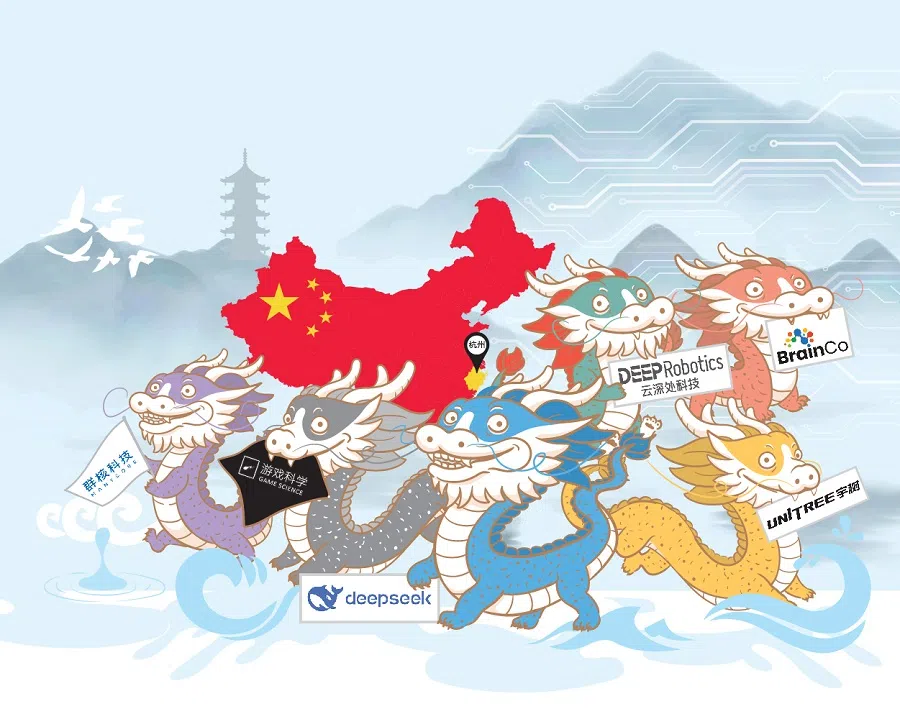
The government’s pro-business stance has also influenced other areas of daily life. Yu, a ride-hailing driver, has noticed a significant change since moving to Hangzhou six months ago — he gets far fewer traffic tickets.
He previously drove in a northern province and used to lose nearly all 12 points on his licence every year. “In Hangzhou, I drive the same way and rarely get fined.”
Can the tech boom last and be replicated?
The meteoric rise of Hangzhou’s Six Little Dragons has provided a much-needed boost to China’s sluggish economy. However, analysts and academics interviewed believe that it remains to be seen how long this tech boom will last and whether it can be replicated in other cities.
Following the rise of the Six Little Dragons, stocks related to DeepSeek and robotics surged in the capital markets. Listed companies with ties to these startups have also enjoyed strong momentum. For instance, energy storage firm Wolong Electric saw its stock price soar by over 40% within a month after announcing a strategic cooperation framework agreement with DEEP Robotics.
However, being at the centre of this hype comes with its own challenges. Cheng Yuhang noted that while robotics has gained mainstream attention, the public still has limited knowledge about its technology, pricing, and practical applications. This has led to a flood of “false demand”, requiring the company to carefully filter out genuine customers.
Cheng said frankly: “Right now there is public acclaim, but turning traffic into actual sales is still difficult.”
... the valuation and fundraising success of Manycore’s IPO will serve as a litmus test for the idea of the Six Little Dragons in capital markets. If it fails to achieve a high valuation, the hype surrounding these companies may gradually cool down. — Shen Meng, Executive Director, Chanson & Co
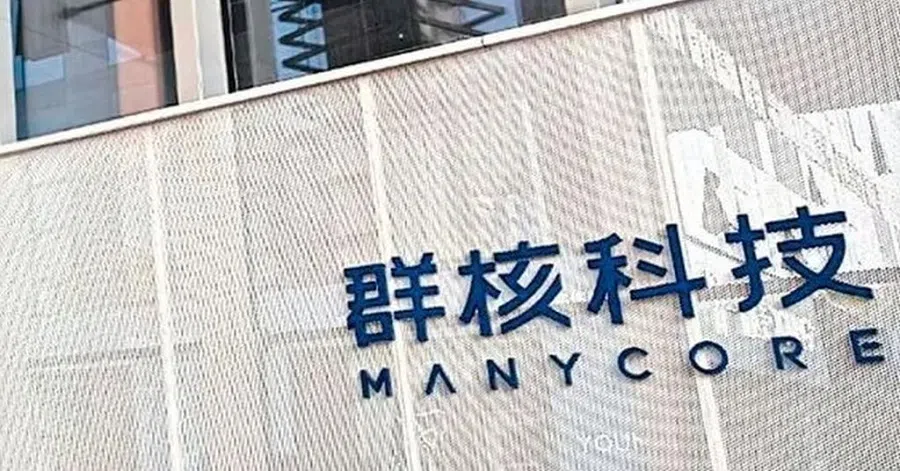
Seizing the momentum, Manycore, one of the Six Little Dragons, formally submitted its initial public offering (IPO) application to the Hong Kong Stock Exchange in mid-February. Previously, in 2021, the company attempted to go public on the US Nasdaq, but dropped the process two years later.
Shen Meng, executive director of Chanson & Co, told Lianhe Zaobao that Manycore’s unsuccessful US listing suggests that the American stock market may not have fully recognised the company’s performance. With no viable IPO window in China’s A-share market, Manycore is now turning to Hong Kong.
Shen noted that the valuation and fundraising success of Manycore’s IPO will serve as a litmus test for the idea of the Six Little Dragons in capital markets. If it fails to achieve a high valuation, the hype surrounding these companies may gradually cool down.
Government influence in the tech boom?
On the other hand, when the economy is bad, the authorities and the media sometimes actively or passively play up certain ideas to divert attention. Shen Meng said: “Previously, everyone was hyping up Hefei’s government as the most successful venture capitalist (VC) in China. Now, all of a sudden, Hangzhou has become the country’s new tech investment hub.”
Shan Wei also believes that official guidance has a hand in the current tech hype, to boost public confidence in the Chinese economy.
However, he noted that the Six Little Dragons have made tangible technological advancements — for instance, DeepSeek has significantly narrowed the gap between Chinese and American AI models. Yet, as OpenAI’s ChatGPT and Elon Musk’s AI ventures continue to evolve, competition in the AI sector remains intense, and the final result is far from decided.
“Maybe in two or three years, if we see an explosive surge in technological advancements, we can then look back and say China has made a qualitative leap.” — Shan
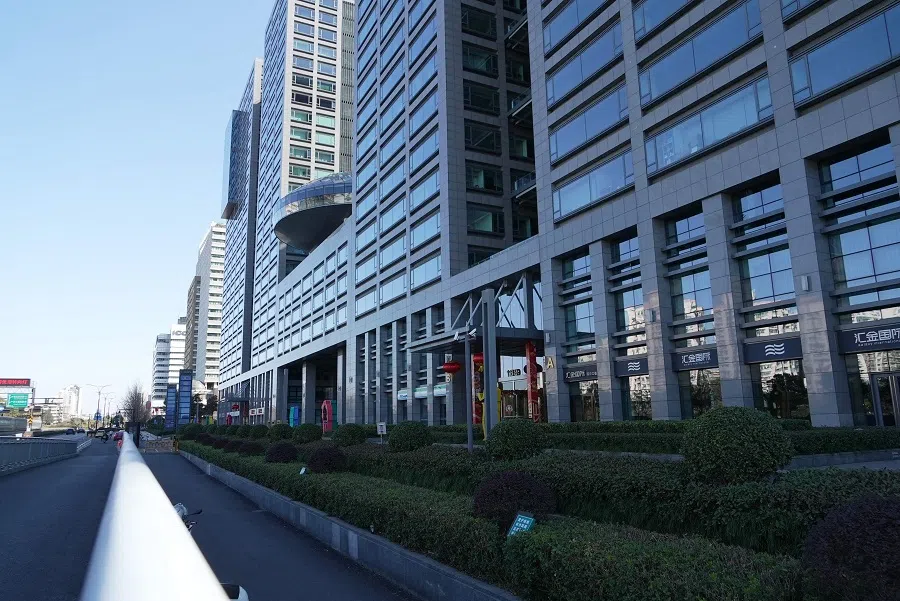
A Hangzhou-based AI engineer surnamed Chen working in the large-model field noted that while many companies aspire to innovate using AI models, in practice, their efforts often become going through the motions, like “holding a hammer and looking for nails”.
As for whether these recent breakthroughs signal a fundamental shift in China’s technological landscape, Shan Wei believes it is too early to say. “Maybe in two or three years, if we see an explosive surge in technological advancements, we can then look back and say China has made a qualitative leap.”
The success of Hangzhou’s Six Little Dragons has sparked discussions in Guangdong, Jiangsu, Shandong, Anhui, and other provinces, where officials and business leaders are now reflecting on why their own cities do not have their own Six Little Dragons.
In Shan Wei’s view, it remains to be seen whether the Hangzhou model can be replicated in other regions. He said it is very difficult to get the government to change its way of doing things; change does not come simply through a leader’s directive, and it may be a gradual process.
Shan Wei added that many local governments now see that innovation cannot be directed, and innovative companies are not born from issuing policy documents and building high-tech zones.
He said: “You never know where innovation will come from, it can’t be predicted. All we can do is minimise interference and allow it to explore in various directions. Most efforts may fail, but the ones that survive are the really strong companies.”
Hangzhou attracts talent with housing and living subsidies
Fresh graduates moving to Hangzhou can stay at Qinghe Yizhan for free for up to seven days, whether or not they secure a job.
Qinghe Yizhan is a free accommodation provided by the Hangzhou government for young talent arriving in the city, which has hosted over 150,000 people since its launch in 2023. This is just one of many initiatives by the Hangzhou government to attract talent.
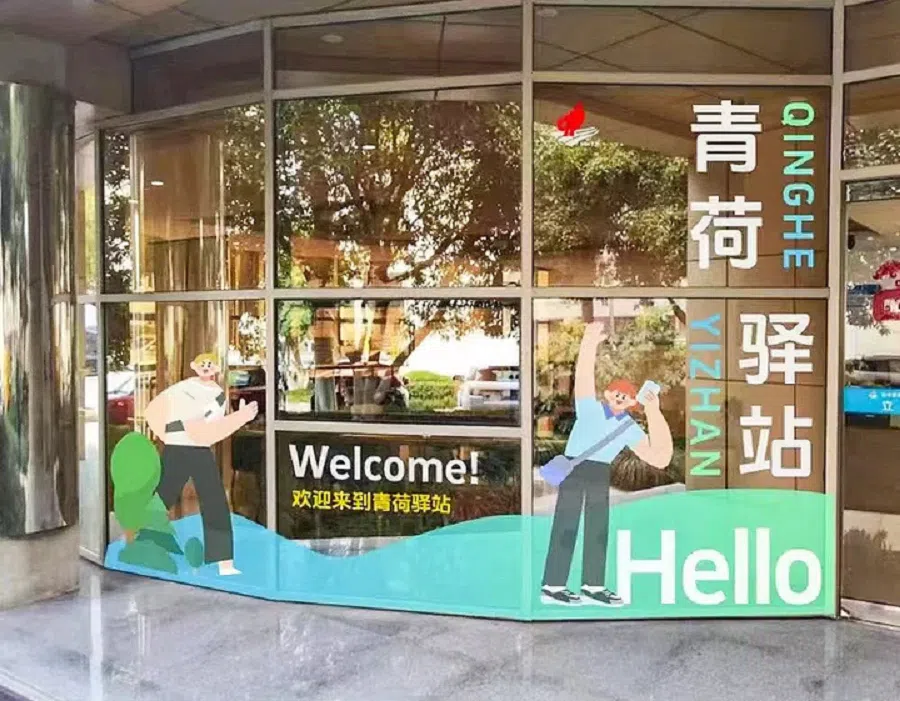
Individuals who qualify as high-level talent in Hangzhou can not only obtain local residency but also receive subsidies ranging from tens of thousands to hundreds of thousands of RMB for housing, rent and daily expenses.
An employee surnamed Li, who works at a major tech company, told Lianhe Zaobao that after graduating and moving to Hangzhou, he received a one-time talent subsidy of 100,000 RMB, with a monthly rental subsidy of 2,500 RMB. If he does not buy a home, he can claim the rental subsidy for up to five years; if he does, he will receive an additional home-buying subsidy.
Driven by official talent policies, Hangzhou has experienced a significant “siphon effect” in population growth in recent years. According to data from the Zhejiang Provincial Bureau of Statistics, as of 2023, Hangzhou has achieved double-digit population growth for nine consecutive years.
In a ranking by zhaopin.com and Zeping Macro of Chinese cities in terms of attracting population, Hangzhou ranked fifth in 2023, after Beijing, Shanghai, Shenzhen and Guangzhou.
... what drew him [a post-90s engineer surnamed Chen] to the city was that he could work on cutting-edge technology and enjoy a fast-paced life, but still slow down occasionally to appreciate Hangzhou’s scenic beauty.
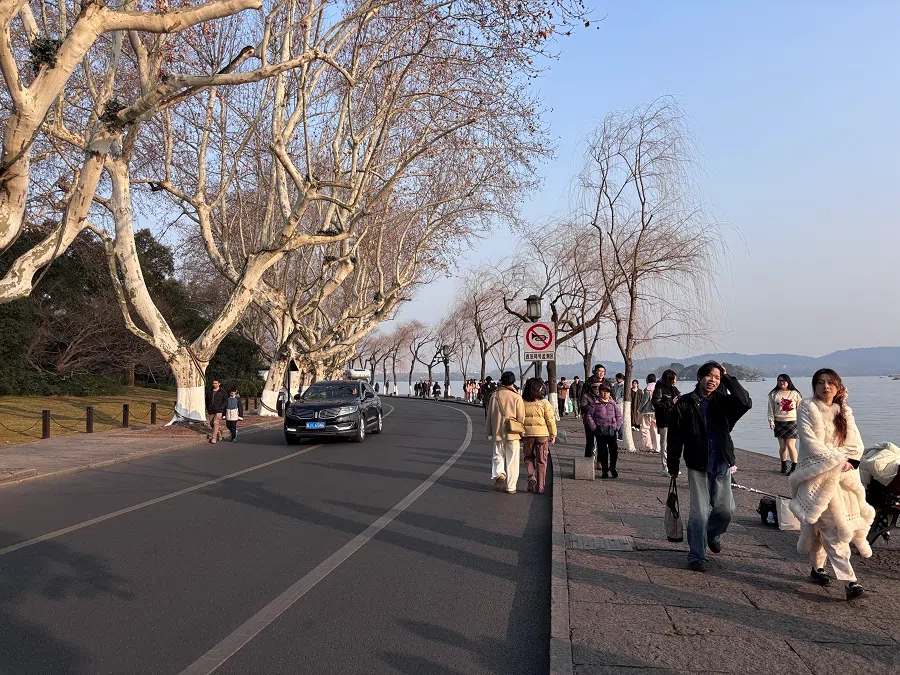
A post-90s engineer surnamed Chen, who moved to Hangzhou after graduating and received local talent subsidies, told Lianhe Zaobao that what drew him to the city was that he could work on cutting-edge technology and enjoy a fast-paced life, but still slow down occasionally to appreciate Hangzhou’s scenic beauty.
A unique urban rhythm ideal for research and development
For businesses, Hangzhou’s unique blend of a fast- and slow-paced lifestyle provides an ideal urban environment for innovators to focus on research and development. Take Game Science, one of the Six Little Dragons. While the company is registered in Shenzhen, it developed Black Myth: Wukong in Hangzhou.
Game Science founder Feng Ji once explained: “Hangzhou’s pace of life is not as fast as Shenzhen’s, and housing prices are not too high, so everyone can be chill.”
This article was first published in Lianhe Zaobao as “杭州六小龙火爆出圈 科企发展潮水到渠成”.





